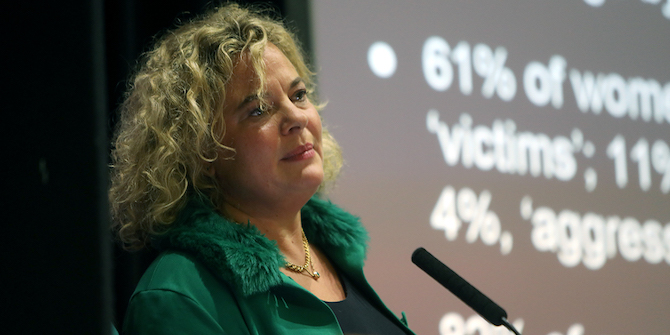Nearly 100 years after they gained the right to vote in the UK, women still don’t enjoy equal political power with men, argues Helen Pankhurst. Equal political representation would only be achieved through a gender equal Parliament.
Emmeline Pankhurst, my great-grandmother once said: “You must make women count as much as men; you must have an equal standard of morals; and the only way to enforce that is through giving women political power so that you can get that equal moral standard registered in the laws of the country. It is the only way.”
The question is, in 2024, a year in which we are almost definitely going to have a general election, do women count as much as me? Do they have equal political power with men in the UK?
All the women MPs there have ever been together wouldn’t even fill the House of Commons.
My answer is “no”, categorically no, even though we have had a few women in the top job. It’s “no”, because there are still only 226 women MPs in the House of Commons out of 650, i.e. 35 per cent. No because there have only ever been 564 women MPs – every woman MP knows her number. They are counting. All the women MPs there have ever been together wouldn’t even fill the House of Commons. My answer is “no” because there are only 237 women in the House of Lords, 29 per cent. There have only ever been 339. If every women Peer since the first who joined the Lords in 1958 was sitting today they still would be less than 43 per cent of the current number of Peers. And finally, to the question “do women count as much as men in the centre of government?”, the answer is again “no”, because only 7 ministers, 30 per cent, in the current cabinet are women.
Seeing fewer women in politics, in all the different possible roles of power, sends the message that women are not as important, not as powerful.
And representation matters, because a sense of alienation from democracy is more likely where representation gaps exist. Seeing fewer women in politics, in all the different possible roles of power, sends the message that women are not as important, not as powerful. But it also matters because of the policy decisions being made and whose experiences are seen – whose experiences count. We saw for example the gender myopia in policies around COVID, e.g. around who benefited from furlough, the shutting of schools, the lack of policies to address the increased risk of domestic violence, etc. Studies also show that overall there is a gender difference to what men and women prioritize and want politicians to tackle e.g. more on health, education and the environment and less on defence. There is also a difference in the way of doing politics, which tends to be more collaborative and less confrontational.
Currently the UK is 48th in the world when it comes to the percentage of women in the lower chamber. Not exactly impressive for the so-called mother of parliaments. Moreover, our ranking is getting worse. Five years ago, we were 39th in the world, i.e. other countries are doing more to address the representation gap, doing more to make sure women count.
At Centenary Action which is a cross-party coalition that I convene, (and through our members which have an outreach in the millions) we are campaigning for a gender equal parliament by 2028 – the Centenary of Equal Franchise which poignantly had its Royal Assent, less than a month before Emmeline’s death.
We need much greater transparency as the opacity around MP selection processes is very much part of the problem.
To get there, we are pushing for the enactment of Section 106 of the Equality Act, which would force parties to publish data on the diversity of their candidates. We need much greater transparency as the opacity around MP selection processes is very much part of the problem. Together with others we are also looking for solutions to the continued inequality including the cultural and structural barriers. These barriers affect black and minority MPs disproportionately. For example, if we look at the issue of online abuse, Diane Abbott received ten times that of what other MPs faced in the 2017 elections. There are also specific constraints faced by disabled candidates. A fund which used to exist to support them is currently not due to be put back in place until after the upcoming elections. Without proper representation, the policies Parliament enacts are likely to render invisible some categories of people, creating a vicious circle of exclusion.
Without real power and therefore without equal representation, in Emmeline’s words, we do not have “an equal standard of morals“. In the words of her middle daughter and my grandmother Sylvia in her book: The Suffragette Movement, “Great is the work that remains to be accomplished.” Getting the right to vote was only ever the beginning.
Voting remains the foundation of democracy. Women represent 51 per cent of the electorate and they are significantly more likely to be swing voters so their votes – our votes – really matter. Policy makers should be targeting and listening to the female voter. Older people are more likely to vote than younger people –resulting in policies that are more likely to reflect their interests. If younger voters – including students at LSE – want this to change they need to register and vote. The act of voting is the essence of citizenship. It is priceless and we take it for granted at our peril.
All articles posted on this blog give the views of the author(s), and not the position of LSE British Politics and Policy, nor of the London School of Economics and Political Science.
Image credit: Luzianna5588 on Shutterstock






